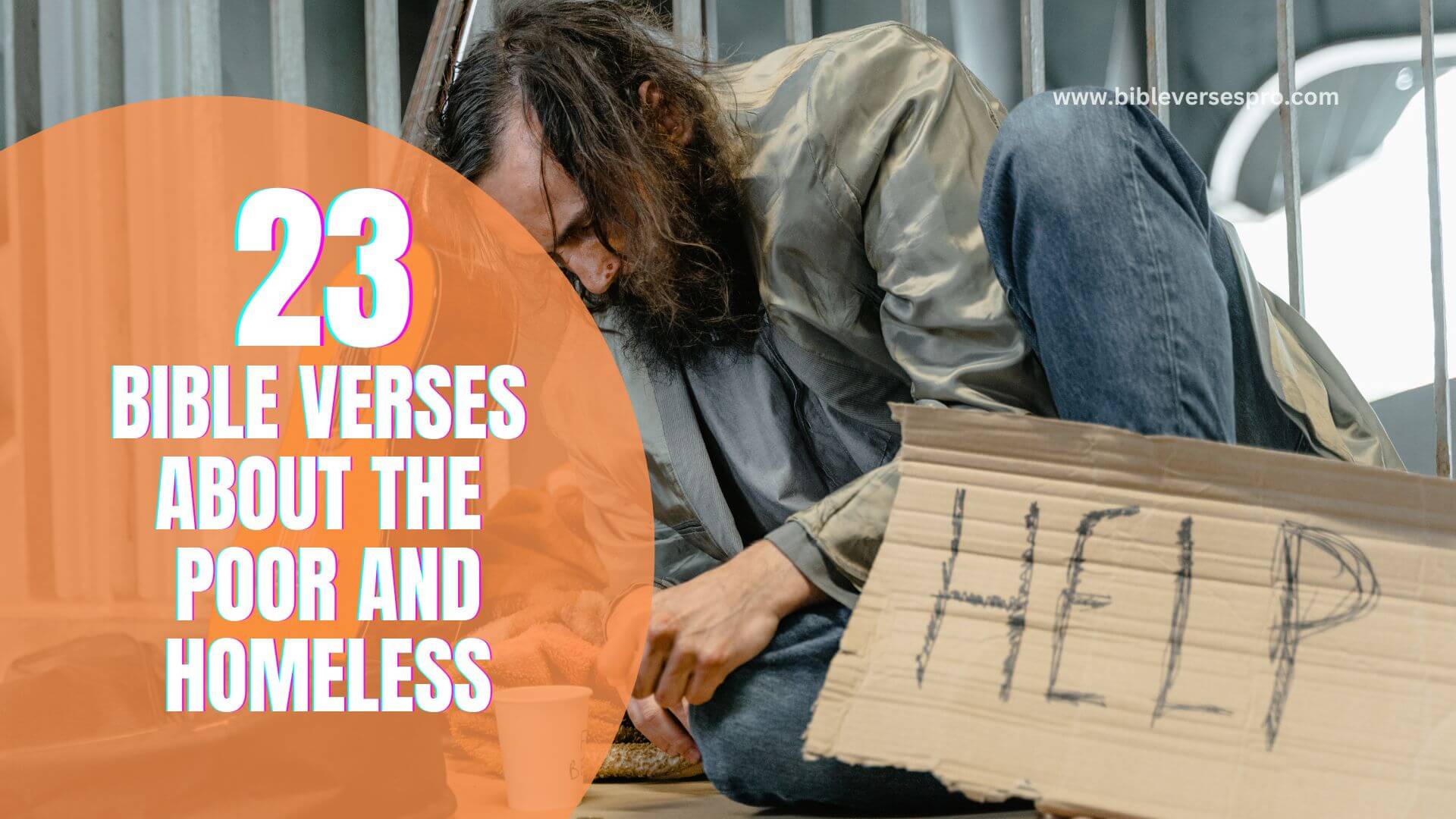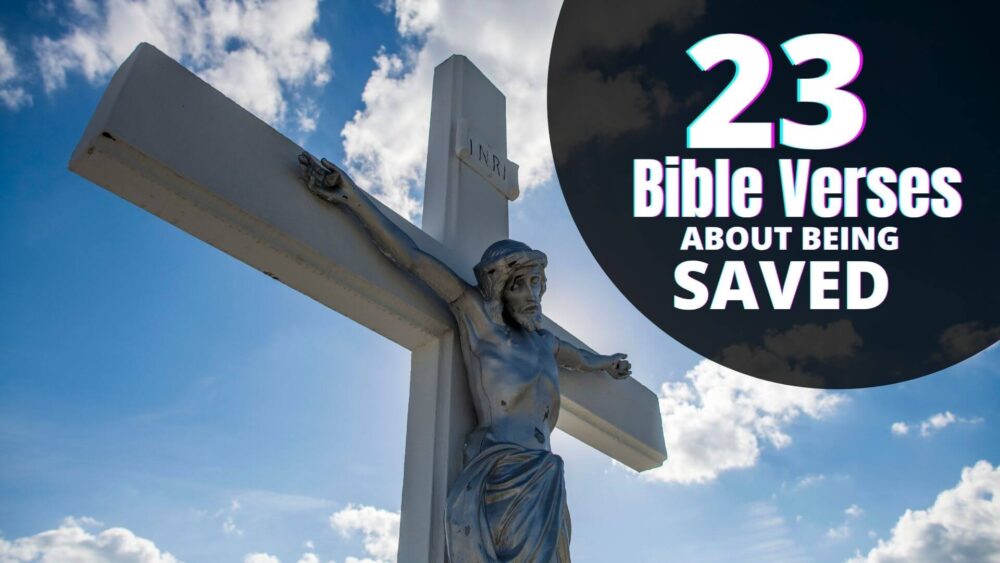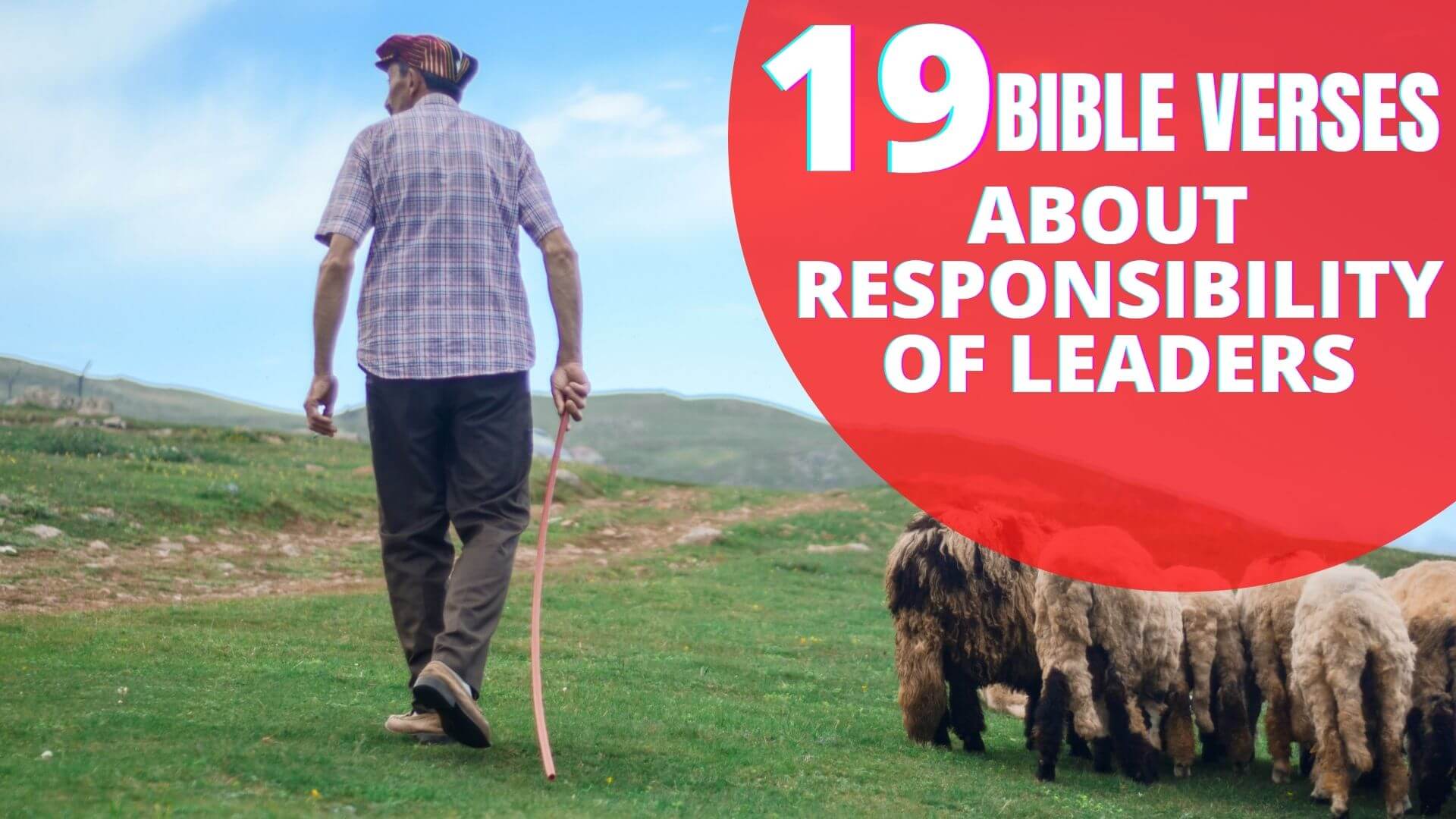In a world where many struggle to make ends meet, it’s more important than ever to remember the importance of caring for the poor and homeless. The Bible is filled with passages that remind us of our responsibility to love and serve others.
Bible Verses About the Poor and Homeless
Christians are called to love and serve others, especially those most vulnerable. The poor and homeless are among the most marginalized and neglected in our society, and the Bible has much to say about how we should treat them.
Here are 23 Bible verses about the poor and homeless to inspire and guide you in making a difference.
Proverbs 29:7 – A good man thinks about the poor.
“The righteous care about justice for the poor, but the wicked have no such concern.”
Proverbs 29:7
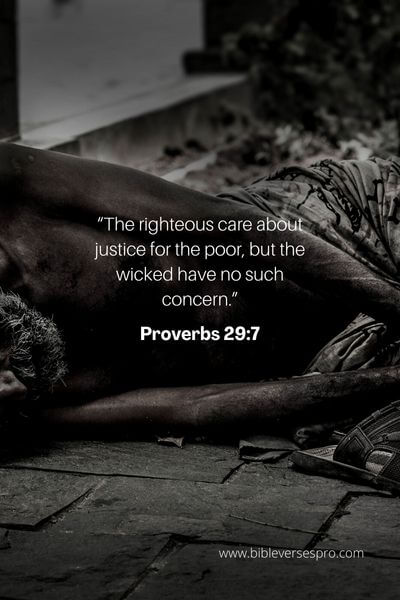
Concerning the poor, neglect or negligence is not an acceptable defense. Wicked men don’t consider them or try to learn about their problems or conditions. But a good man thinks about the poor, investigates their situation, and discovers what they need and how he may help.
In this case, ignorance is neither blissful, nor a defense since God will punish the self-centered person who fails to care for and consider the needs of the underprivileged.
Exodus 23:10-11 – The Sabbath year.
“For six years you are to sow your fields and harvest the crops, but during the seventh year let the land lie unplowed and unused. Then the poor among your people may get food from it, and the wild animals may eat what is left.”
Exodus 23:10-11
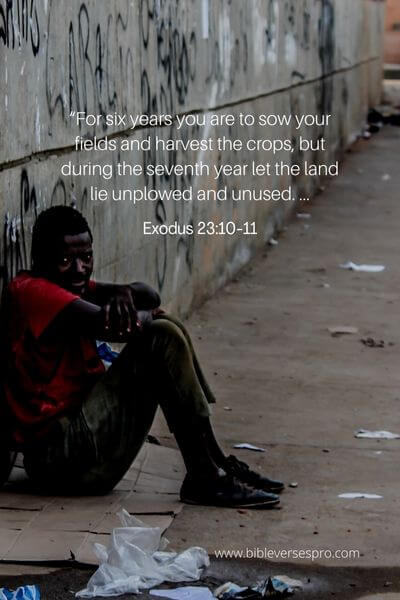
According to this bible passage, God put in place the Sabbath year to provide the needy with food by allowing them to gather and prepare what grew unharvested on the farmland.
This approach to helping the poor requires land owners to restrain themselves from maximizing profit and the needy to work to help themselves.
Leviticus19:9-10 – Generosity.
“‘When you reap the harvest of your land, do not reap to the very edges of your field or gather the gleanings of your harvest. Do not go over your vineyard a second time or pick up the grapes that have fallen. Leave them for the poor and the foreigner. I am the Lord your God.’”
Leviticus19:9-10
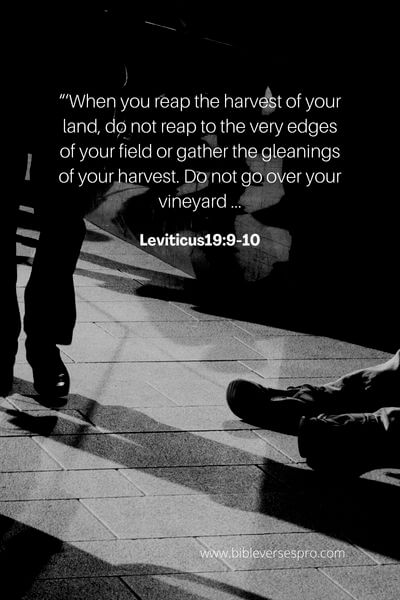
This was one of Israel’s public assistance schemes in the Old Testament. Farmers were instructed to leave some of their fields unharvested so that the needy and destitute may come and gather the leftovers for themselves. Grapes and grain were still hanging on the vine in the field’s corners.
This proves God is concerned about the poor and wants to provide them with opportunities. The poor and the foreigner both benefited greatly from this.
The poor were to be active, and labor for their food, and the farmers were told to have generous hearts. It paved the door for the poorest to meet their needs with work and dignity.
1 Samuel 2:8 – God is in control.
“He raises the poor from the dust and lifts the needy from the ash heap; he seats them with princes and has them inherit a throne of honor. ‘For the foundations of the earth are the Lord’s; on them he has set the world.’”
1 Samuel 2:8
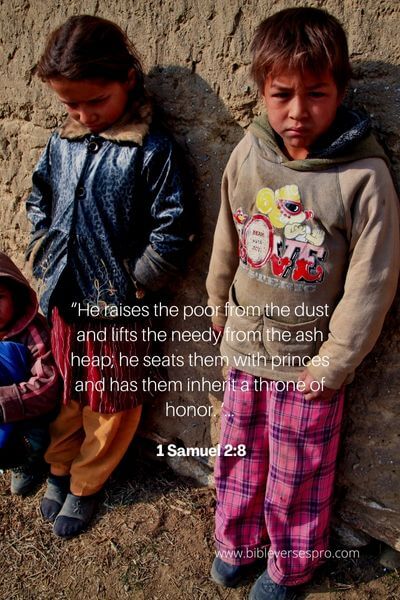
God is in control. Therefore he has the power to exalt the weak and humble the great. If God were not in charge, the powerful might be free to act however they pleased without interference from God.
The LORD owned the very pillars that formed the earth’s foundation. God utilizes His authority to restore order. Just knowing that God can do something doesn’t satisfy. We must understand that He will employ it for His honor and justice.
Job 5:15-17 – God protects those who help others.
“He saves the needy from the sword in their mouth; he saves them from the clutches of the powerful. So the poor have hope, and injustice shuts its mouth.”
Job 5:15-17
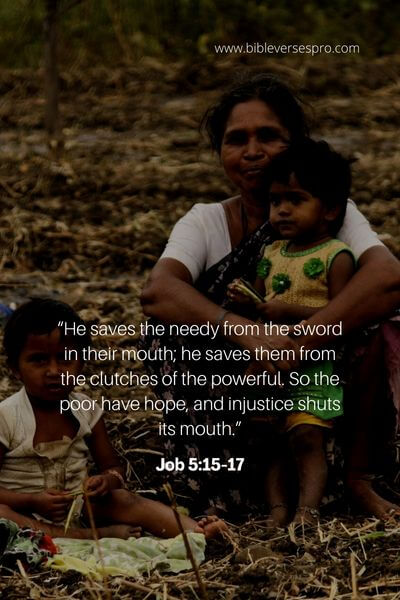
When God loves someone, he lifts them out from beneath pompous men’s feet and places them in safety. He helps, consoles, and elevates the grieving and lowly so they can live on high.
However, God gives special protection to those who have dedicated themselves to him because they are poor and unable to help themselves because they are his own and dedicated to his praise.
He protects them from the tongue that speaks harsh words and the hand that uses brutal actions against them because he can tie the language and wither the hand at will.
Proverbs 21:13 – How you hear is how you will be heard.
“Whoever shuts their ears to the cry of the poor will also cry out and not be answered.”
Proverbs 21:13
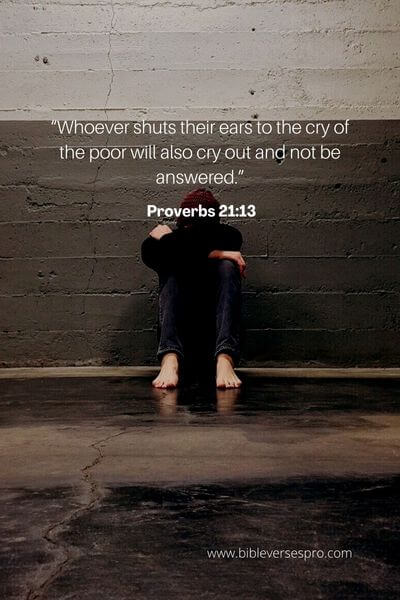
It will be difficult for us to get guidance from God if we ignore the poor. God will value our readiness to assist them.
The way you hear is the way you will be heard! God and others won’t listen to you when you urgently ask them for assistance if you disregard the poor’s pleas for help.
Proverbs 22:9 – He is happy to witness a prosperous man giving freely.
“The generous will themselves be blessed, for they share their food with the poor.”
Proverbs 22:9
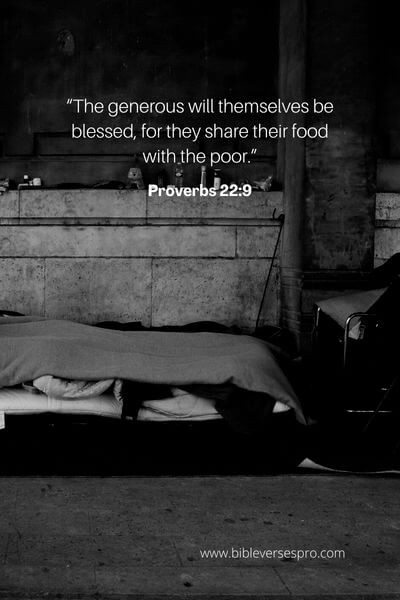
God appreciates those who give generously. Giving to the needy is a form of lending to the All-Powerful God, and He repays you richly. God will bless the individual who contributes eagerly and liberally to the needy.
God protects the needy because He denied them the chances and abilities He granted others. He is happy to witness a prosperous man giving freely and liberally to aid disadvantaged people.
God will reward the person who contributes liberally, defined as giving freely and kindly, above and beyond the call of duty, clearly, and freely.
Luke 11:41 – The acceptable offering.
“But now as for what is inside you—be generous to the poor, and everything will be clean for you.”
Luke 11:41

God doesn’t want us to give out of our lack, risk harm to our families, or offer anything we don’t have to others. The best gifts we can provide are those we already possess (things that originate from within us).
In this manner, we are assured that it will be a pure offering acceptable to God and the person receiving it. Giving from what we have already acquired will be a virgin and an excellent offering to God.
Proverbs 3:27-28 – Honest and honorable persons do not hesitate to help.
Withhold not good from them to whom it is due, when it is in the power of thine hand to do it. Say not unto thy neighbour, Go, and come again, and to morrow I will give; when thou hast it by thee.
Proverbs 3:27-28

If you’re able to, you must give excellent things to people who are in need. Your debt may be related to legal, professional, or financial obligations and religious issues like mercy and charity.
When in a position to assist our neighbors, honest and honorable persons won’t hesitate to meet their needs. They won’t scare away their neighbors with assurances of future goodness or performance.
Proverbs 14:21 – Your actions have an impact on God.
He that despiseth his neighbour sinneth: but he that hath mercy on the poor, happy is he.
Proverbs 14:21
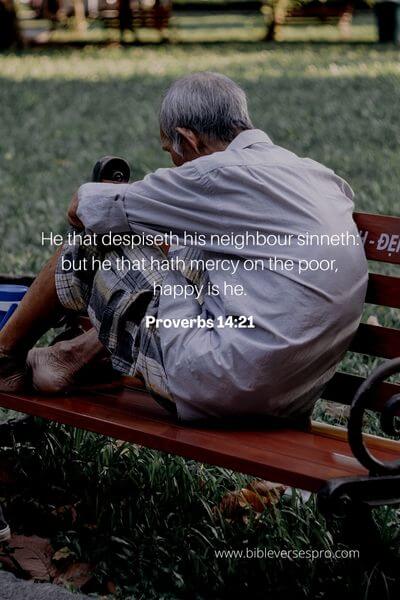
Your actions towards others impact God, those close to you, and your own life. When you oppress people harshly, selfishly, or violently, you offend God, harm those who need assistance, and cause yourself to suffer.
You honor the heavenly God, delight others, and find satisfaction in yourself if you are gentle, kind, giving, and protective of others.
Psalm 37:16
A little that a righteous man hath is better than the riches of many wicked.
Psalm 37:16
The little the upright man has is better than all the wicked possess since whatever the wicked have cannot last. The best long-term investment is a God-fearing, decent life. Let’s remain assured that God will make everything work for our good.
The limited resources given to the virtuous are more convenient and beneficial than the dishonestly acquired and mishandled wealth of godless persons.
They possess that which is superior to wealth, peace of mind, and finally, peace in God that neither the world nor its inhabitants can provide or have.
Proverbs 28:6
Better is the poor that walketh in his uprightness, than he that is perverse in ways, though he be rich.
Proverbs 28:6
Poverty is not the worst thing in the world. The worst thing is to be a terrible person who lacks dignity. The poor, who are frequently mistreated, should take heart from this.
The honest poor person is better off than a rich person who lives twistedly in the eyes of God or other people. More than our money account or financial worth, our character best defines who we are.
Psalm 9:18
For the needy shall not alway be forgotten: the expectation of the poor shall not perish for ever.
Psalm 9:18
The poor may feel abandoned when facing financial difficulties. But in the end, God provides for His people even in adversity.
He will always support them in a spiritual sense and frequently in a material reason as well. Furthermore, those who follow Christ and live in poverty expect to one day live a better life.
Deuteronomy 10:17-18
For the LORD your God is God of gods, and Lord of lords, a great God, a mighty, and a terrible, which regardeth not persons, nor taketh reward: He doth execute the judgment of the fatherless and widow, and loveth the stranger, in giving him food and raiment. Love ye therefore the stranger: for ye were strangers in the land of Egypt.
Deuteronomy 10:17-18
Here, we learn about our obligation to one another. We must respect all men because of the gifts that God has given us all. And those who have experienced hardship themselves and have found mercy from God ought to be prepared to be friendly to those experiencing similar problems.
We are taught our responsibility to ourselves here. Transform your hearts. Remove all corrupt tendencies and affections that prevent you from adoring and respecting God.
James 2:5
Hearken, my beloved brethren, Hath not God chosen the poor of this world rich in faith, and heirs of the kingdom which he hath promised to them that love him?
James 2:5
Showing preference for the wealthy over the needy demonstrates that we don’t believe what we say we do.
The riches of this world can become an obstacle to faith because the wealthy man too often puts his hope in his bank account or trusts in his wealth to get him out of difficult situations instead of relying on the Lord to provide what is needed according to His riches in glory.
God does not favor the poor by making them rich in faith, but He does know that the riches of this world can become an obstacle to faith.
He is also aware of how much more likely a person in needy circumstances is to accept God’s tremendous gift of salvation, which is offered freely to everyone.
Proverbs 22:9
He that hath a bountiful eye shall be blessed; for he giveth of his bread to the poor
Proverbs 22:9
The individual who contributes eagerly and freely to the needy will receive blessings from God. God protects the poor by denying them the chances and skills He granted to others while protecting others.
Doing something for them is more important than just thinking about them (II Cor 8:11; ). God also appreciates seeing a prosperous man give happily and generously to needy people.
When we contribute generously, freely, and above what is expected, creatively, and impulsively we will get God’s blessing.
Proverbs 19:4
Wealth maketh many friends; but the poor is separated from his neighbour.
Proverbs 19:4
Many friends can be purchased with money because wealthy people may quickly assemble a group of cheerful and helpful friends. Friendships based on money are false, and the happy and willing entourage is self-centered and looking out for themselves.
On the other hand, poor men without money cannot even influence their neighbors to be friendly. As soon as the money runs gone, the entourage vanishes, and the flimsy friends take off. Even former helpful neighbors avoid and reject a poor man.
Recommended posts
Bible Verses About Hunger and Poverty
Hunger and poverty are pressing issues affecting millions of people worldwide. The Bible offers guidance and inspiration for those looking to make a difference in the lives of the less fortunate. Let us look at some of the most influential Bible verses about hunger and poverty to help guide and encourage you to love and serve others.
Philippians 4:12
I know what it is to be in need, and I know what it is to have plenty. I have learned the secret of being content in any and every situation, whether well fed or hungry, whether living in plenty or in want.
Philippians 4:12
Matthew 25:35,40
“… for I was hungry and you gave me food, I was thirsty and you gave me something to drink”
Matthew 25:35,40
We honor and love an unseeable God. He forbade us from creating an image of him, yet he has branded humanity with his likeness. We must see and serve our fellow humans if we are to see him and help him.
The believer did these things without realizing they were serving Christ. Jesus states that they were gracious to him whenever they fed the hungry, welcomed strangers, dressed the naked, or paid visits to the sick or imprisoned. Jesus can relate to the less fortunate because he has been in their position.
Deuteronomy 15:10-11
“Since there will never cease to be some in need on the earth, I therefore command you, ‘Open your hand to the poor and needy neighbor in your land.’”
Deuteronomy 15:10-11
As believers, we must take the command to contribute into consideration today. Like so many other things, it is both an order and a request.
If we accept and acknowledge God’s rule over us and wish to take advantage of what he offers, it is a request because God always respects our right to free choice and a commandment.
Then, to discover how to become the individuals he claims we can be, we must comply with his requests. Along with that, it comes with some fantastic blessings. Obtaining success in whatever we do and everything our hands touch.
Isaiah 58:6-11
“Is not this the fast that I choose: to loose the bonds of injustice, to undo the thongs of the yoke, to let the oppressed go free, and to break every yoke? Is it not to share your bread with the hungry, and bring the homeless poor into your house; when you see the naked, to cover them, and not to hide yourself from your own kin?”
Isaiah 58:6-11
God instructs us to “Start by making amends with your brothers and sisters if you wish to fast in a way that pleases Me. They have to cease acting cruelly toward others and start reaching out to help others.
This implies that the first step in making things right with God is to stop doing bad things to other people. After that, they had to start acting lovingly toward other people. This suggests that working in a caring manner toward others helps us to remain in God’s good graces.
Luke 6:20-21, 24-25
“Blessed are you who are poor, for yours is the kingdom of God. Blessed are you who are hungry now, for you will be filled… But woe to you who are rich, for you have received your consolation. Woe to you who are full now, for you will be hungry.”
Luke 6:20-21, 24-25
We first must understand that Jesus does not mean that all poor are fortunate. He is emphasizing that His poor disciples are blessed. This is a case of poverty with grace.
This means being poor in material goods yet affluent toward God. This entails giving up an earthly treasure and storing up wealth in heaven. This kind of poverty is wisely investing for eternity.
1 John 3:17-18
“How does God’s love abide in anyone who has the world’s goods and sees a brother or sister in need and yet refuses help? Little children, let us love, not in word or speech, but in truth and action.”
1 John 3:17-18
This happens when someone has more than enough to meet their wants, but instead of showing compassion for the needs of others, they choose to be cold-hearted.
A lack of affection is demonstrated by having possessions beyond what is necessary while brothers or sisters suffer. A follower of Christ should care for other people’s needs on more than just an emotional level.
Conclusion
This article is an excellent starting point for anyone familiarizing themselves with the Bible’s perspective on the poor and homeless. It also serves as a good reminder for us all about what these passages contain and what impact they could have on our lives.

